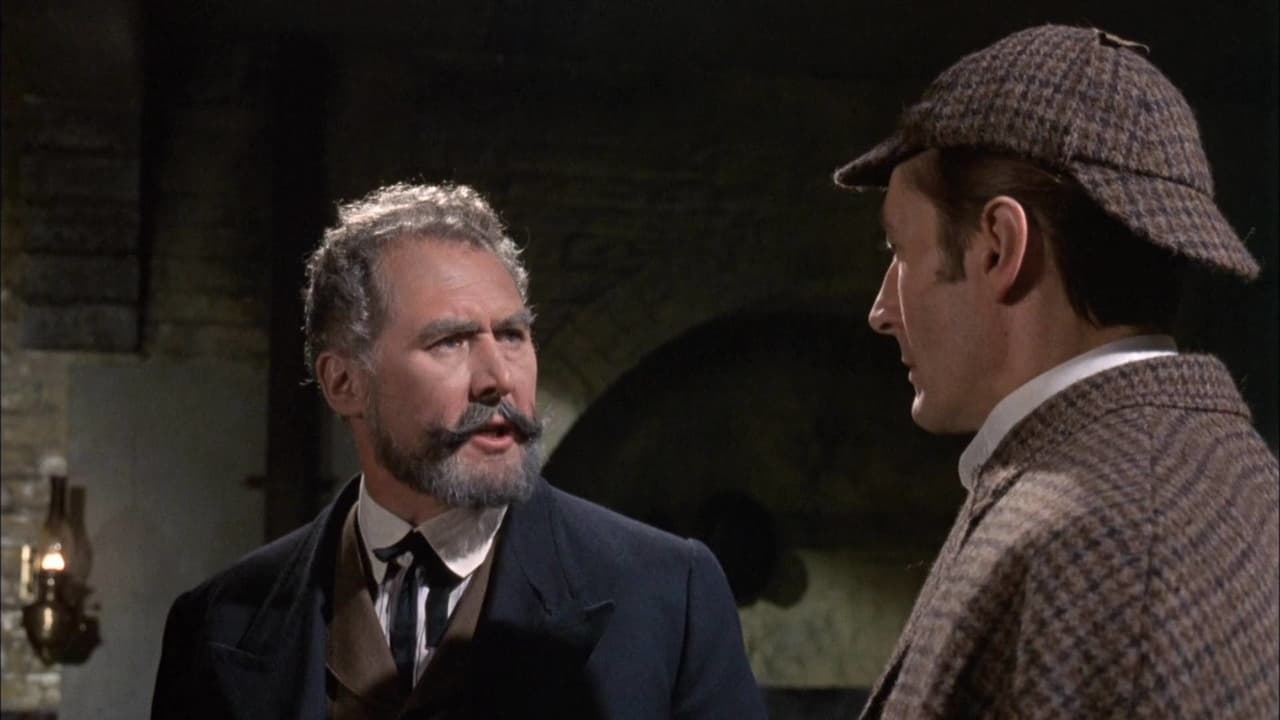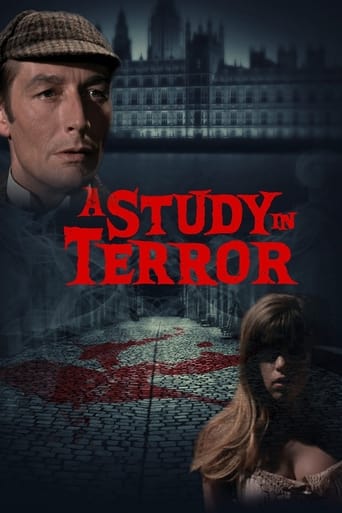ScoobyMint
Disappointment for a huge fan!
Joanna Mccarty
Amazing worth wacthing. So good. Biased but well made with many good points.
Jenni Devyn
Worth seeing just to witness how winsome it is.
grizzledgeezer
Most Sherlock Holmes films are terrible. The Jeremy Brett TV series remains the platinum standard, against which just about everything else lags far behind. (The Basil Rathbone films are a major disappointment, because the producers were too cheap to create period films, and Rathbone's superior performance is wasted on less-than-Doyle-quality stories.) It's actually possible to talk about "A Study in Terror" with the Brett series in the same breath. It's that good.It has two flaws (which I'll get out of the way first). It was photographed with what are (by today's standards) primitive color film. The contrast is so great, that it's hard to light darker scenes to get any real sense of atmosphere (though some come close).The other is that the script, and to a lesser degree John Neville's performance, give Holmes a degree of wit and warmth lacking from Doyle's original. His is not quite the Holmes we're expecting.The strong suit is the script, with plausible situations, strong characterizations, and solid dialog.Recommended.
BA_Harrison
A Study in Terror unites two of my favourite movie characters, one fictional, and one very real: Conan Doyle's super sleuth Sherlock Holmes and infamous serial killer Jack the Ripper. Although it's far from the best film to feature either character, there is still plenty of fun to be had as Holmes (John Neville, channelling Basil Rathbone) does his thing, uncovering a dastardly blackmail plot that has had dreadful consequences for Whitechapel's working girls.In merging the literary with real-life, huge liberties have clearly been taken with any facts, and avid Ripper-ologists will be able to tear a new one out of the script as historical detail quickly falls by the wayside in favour of the fanciful. Fortunately, the film is just too much fun to let factual inaccuracy spoil matters too much. The murders are nice and gruesome, there's a well staged fight scene that sees Holmes and Watson (Donald Houston) duke it out with some thugs, we get to meet Holmes' equally brilliant brother Mycroft (Robert Morley), eye candy is provided by the rather-too-attractive, soon-to-be-dead whores (who include Carry On regular Babs Windsor), and the whole mystery keeps the viewer guessing right till the end.
Scott LeBrun
Here, the legendary fictional detective Sherlock Holmes (John Neville) is on the case of the infamous real life murderer Jack the Ripper, brutally murdering Whitechapel prostitutes in Victorian London in this exceptionally good looking and twist-laden, nicely written movie. Without my spoiling things too much, Holmes learns that a well to do family is caught up in the drama.The idea of pitting Holmes against The Ripper is a clever one, and would be visited again 14 years later in "Murder by Decree". It's also a pleasure to see a cast full of esteemed British acting talent, beginning with Neville, whose Holmes is not only blessed with that intelligence and incredible deductive ability but true charisma as well. Donald Houston is a genial Dr. Watson. Notable is that two of the cast members here, Frank Finlay and Anthony Quayle, are also in "Murder by Decree". Finlay plays Inspector Lestrade in both movies while Quayle plays different roles.Wonderful atmosphere and production & costume design mix with efficient direction by James Hill ("Born Free", "Black Beauty" '71) and a story that is detailed but never too hard to follow. While some viewers may be able to figure out the identity of the killer, they may not anticipate just how Holmes is able to crack the case, which becomes one of the most interesting elements here. Sex and violence are accented here to a degree, with an eyeful of some of the ladies' bosoms and a little dose of the red stuff.The excellent cast also includes a young Dame Judi Dench, in one of her earliest movie roles, as well as John Fraser, Adrienne Corri, Charles Regnier, Cecil Parker, Peter Carsten, John Cairney, Edina Ronay, and Avis Bunnage.The movie is by turns suspenseful, exciting, creepy, and funny, with the two stars sharing a marvellous chemistry. And, speaking of exciting, the ending is a true corker, and will have viewers on the edge of their seats. The pacing is consistently strong and the sense of danger created right from the start. It would indeed be amusing to compare and contrast "A Study in Terror" and "Murder by Decree" and have a solid double feature of Holmes vs. The Ripper mysteries.Executive produced by Herman Cohen.Eight out of 10.
Martin Bradley
Another guilty pleasure and a surprisingly enjoyable one. Here we have Sherlock Holmes investigating the Jack the Ripper movies in a beautifully evoked Victorian London shot in considerably garish, and sometimes lurid, colours; (all credit to Art Director Alex Vetchinsky and Cinematographer Desmond Dickinson).John Neville is a dapper, (and ever so slightly camp), Holmes and Donald Houston is excellent as a buffoonish, generous-hearted Watson. The script isn't at all bad and there is an outstanding supporting cast that includes Anthony Quayle, Robert Morley, Cecil Parker, Adrienne Corri and Kay Walsh. There is also an attractive young lady by the name of Judi Dench in what was only her third film. The atmospheric direction is by James Hill who, despite winning an Oscar for the short "Giuseppina", seemed relegated mostly to TV work. A movie that just might be deserving of cult status.

